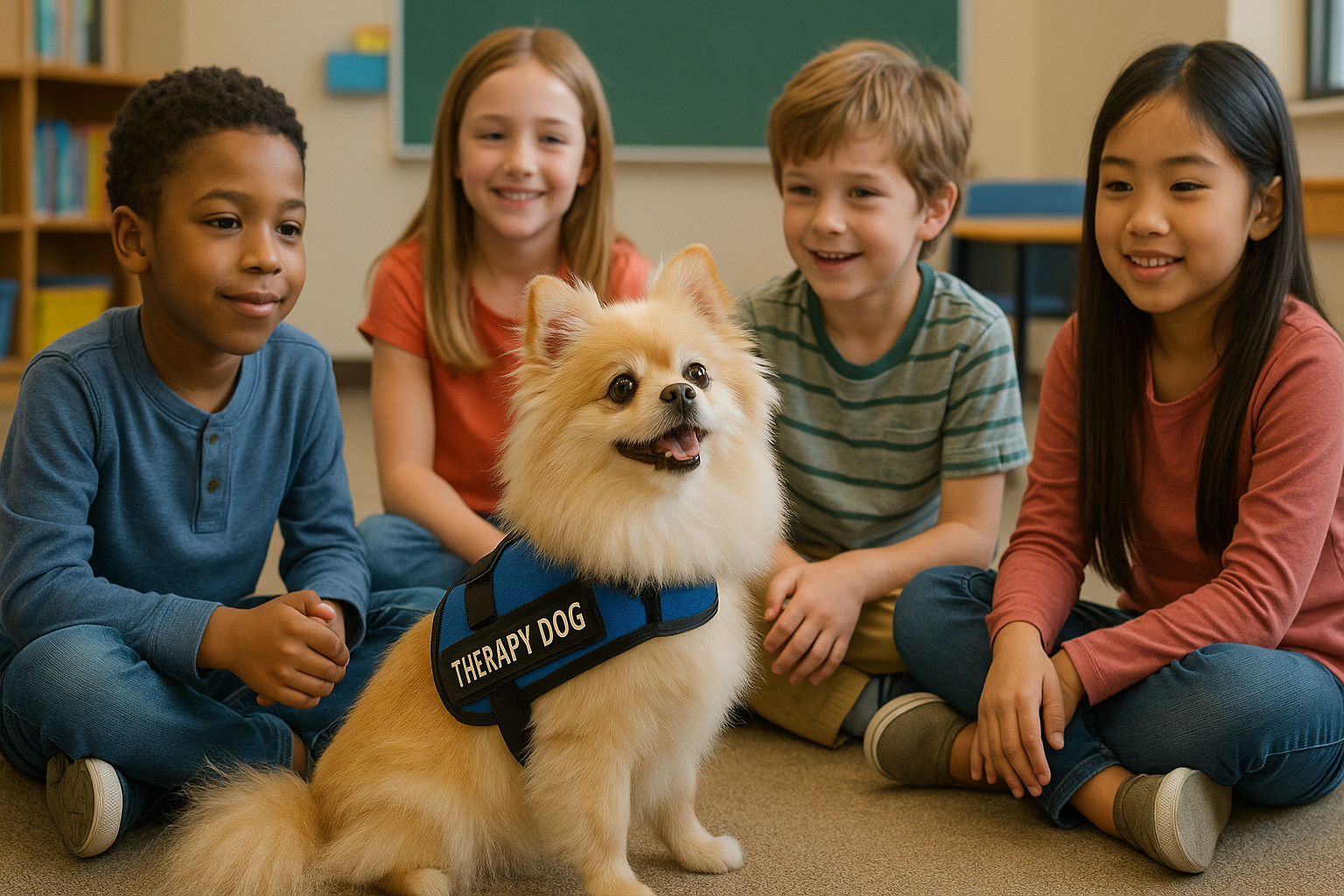Pomeranian as a Therapy Dog
Get Your Documents

Pomeranian as a Therapy Dog Overview
The Pomeranian, with its abundant personality and fluff, is not just a charming companion but can also be an excellent therapy dog. Known for their extroverted demeanor and intelligence, Pomeranians have the potential to excel in various therapy settings, bringing joy and comfort to many.
Understanding the Therapy Dog Role
Therapy dogs are trained to provide emotional support and comfort to individuals in need. Unlike service dogs, which are trained to perform specific tasks for people with disabilities, therapy dogs visit hospitals, schools, nursing homes, and other environments to improve the well-being of those they interact with. This role requires a distinct set of personality traits, including empathy, friendliness, and a calm disposition.
Physical Appearance and Energy Level
The Pomeranian is a small, energetic breed, typically weighing between three to seven pounds. Their fluffy double coat and bright, alert eyes make them immediately endearing. While their small size can be an advantage in therapy settings—allowing them to work well in confined spaces or on individuals’ laps—they possess a high energy level that must be managed effectively to ensure they provide comfort without becoming overwhelming.
Personality and Emotional Intelligence
Pomeranians are known for their outgoing personalities. They are confident and curious, often described as having the demeanor of a larger dog in a small dog’s body. This confidence and outward focus can make them effective in therapy settings where approachability is vital. Their strong emotional intelligence allows them to pick up on human emotions, responding to sadness or anxiety with comforting behaviors such as nuzzling or sitting quietly.
- Empathy: Pomeranians show an innate ability to empathize with humans, a crucial trait for therapy work.
- Calmness Under Pressure: Despite their energetic nature, Pomeranians can exhibit calmness when necessary, crucial in therapy settings that require a serene presence.
- Adaptability: They can adapt to different environments, making them suitable for various therapy settings.
Environments Where Pomeranian Excels
Pomeranians shine in environments where their size and temperament can be fully utilized. Their ability to form strong bonds with people quickly and their adaptable personalities mean they can excel in several therapy settings:
- Hospitals and Nursing Homes: Their small size allows them to maneuver easily in these spaces and sit comfortably on hospital beds or laps, providing warmth and emotional comfort.
- Schools: Their playful and attention-seeking nature can help engage with children effectively, providing a sense of joy and relaxation.
- Rehabilitation Centers: Their energetic disposition can be motivating for patients undergoing therapy, encouraging participation and activity.
Common Therapy Settings
- Hospital Visits: Pomeranians can provide significant emotional benefits to patients, offering a sense of normalcy and companionship.
- Nursing Homes and Assisted Living Facilities: Elderly residents often experience isolation, and the companionship of a Pomeranian can alleviate feelings of loneliness and depression.
- Educational and Support Centers for Children: Their playful nature and gentle demeanor are particularly beneficial for children, especially those with developmental challenges.
Interactions with Different Populations
Pomeranians, with their engaging personalities, are well-suited to interact with a wide range of populations:
- Children: They are naturally good with children, provided the interactions are supervised to prevent over-excitement.
- Elderly: Their small size and gentle nature make them ideal companions for elderly individuals who may be fragile or less mobile.
- Individuals with Mental Health Challenges: Their keen ability to sense emotions makes them suitable for supporting individuals dealing with anxiety, depression, or PTSD.
Health and Wellness Factors
Ensuring that a Pomeranian is healthy is crucial to their role as a therapy dog. Their small size makes them prone to specific health issues that could affect their performance:
- Dental Issues: Regular dental care is essential, as Pomeranians are prone to teeth problems.
- Luxating Patellas: Regular veterinary check-ups can help manage this common joint issue.
- Tracheal Collapse: Awareness and careful handling are necessary to prevent this condition from causing discomfort.
Lifespan and Common Health Issues
Pomeranians have a lifespan of 12 to 16 years, which means they can have a long career as therapy dogs. However, potential health problems like heart issues, skin conditions, and eye problems should be monitored continuously to ensure they remain healthy and comfortable during their therapy work.
Maintenance and Care Needs
The Pomeranian’s beautiful coat requires regular grooming to remain in top condition—a necessity not just for aesthetics, but for the dog’s health and comfort. Regular brushing, along with occasional baths, can prevent matting and skin issues. Additionally, their energetic nature necessitates routine exercise to keep them healthy and well-adjusted.
Training and Certification Readiness
Training a Pomeranian for therapy work requires patience and consistency. Because of their intelligence and eagerness to learn, they can excel in training programs designed to improve their behavior and adapt them to different therapy scenarios. Successful training involves:
- Basic Obedience: Ensuring the Pomeranian is well-versed in commands like sit, stay, and come.
- Desensitization: Familiarizing them with a variety of environments to prevent anxiety or overstimulation.
- Certification Programs: Enrolling them in therapy dog certification programs, which assess their temperament and ability to perform tasks required in therapy settings.
Learning Style and Responsiveness
Pomeranians are highly intelligent and capable of learning new tasks quickly, provided the training is engaging and positive. They respond well to positive reinforcement techniques and are motivated by treats and praise. However, their sometimes stubborn nature means that training must be consistent and patient.
Handling Social and Emotional Stimuli
A Pomeranian can be very responsive to social and emotional stimuli, which is a critical aspect of therapy work. Their sensitivity to human emotions equips them to react appropriately to individuals expressing distress or happiness, providing necessary support or companionship.
Strengths, Limitations, and Ideal Roles for Pomeranian
- Strengths: Their approachable demeanor, intelligence, and adaptability make Pomeranians excellent candidates for therapy roles.
- Limitations: Their small stature might not be suitable for therapy roles requiring substantial physical tasks, such as supporting weight or guiding.
- Ideal Roles: Companion therapy work in hospitals, schools, and nursing homes, where their personality can be used to build connections and uplift spirits.
Final Thoughts
Pomeranians, with their charming personalities and intelligence, are well-suited to therapy roles where emotional support and companionship are essential. While they require specific care and attention to health and grooming to perform effectively, their ability to adapt and connect deeply with humans makes them invaluable in various therapy settings.
Key Takeaways for the Pomeranian as a Therapy Dog
- Best suited for: Companion therapy settings, including hospitals, nursing homes, and schools.
- Not ideal for: Physical support roles or environments needing large amounts of physical assistance.
- Temperament highlights: Outgoing, intelligent, and adaptable.
- Care and health notes: Regular grooming and veterinary care are essential due to potential health issues.
- Therapy environments where they shine: Hospitals, schools, nursing homes, and rehabilitation centers.
Get Your Documents
Example State Cards













